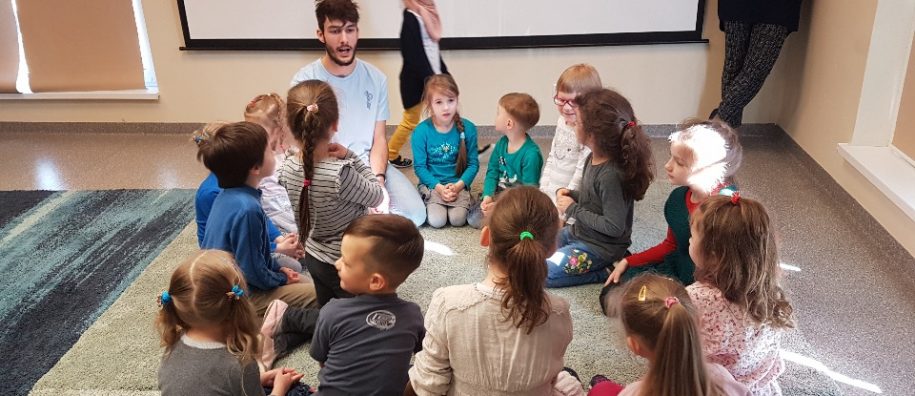News

8 May, 2018
Univ of La Rochelle Interns Love Teaching Kindergarteners French
This spring 2018 semester, Mykolas Romeris University (MRU) Erasmus+ exchange students from France and students of the philology programme, English for Specific Purposes and the Second Foreign Language, continue to teach Vilnius Strazdanėlės kindergarteners French.
The project, PARLES-TU FRANÇAIS is supported by the French Language Teachers` Association of Lithuania.
Students from France's University of La Rochelle shared their experience and impressions from the French classes, which they taught.
Student Féhima Zerguit:
I love teaching children because I find it important to share our knowledge, and children are always happy and proud to learn new things. For French classes, we prepare a small course and activities to put children in situations for using different types of materials. I think it's more interesting this way. We try to make children understand the concept, the idea. We do not only teach them a word, we try to make them able to recognize things in their environment. And they are always motivated to play. They have a great sense of humor, so for me it is always a pleasure to go to Strazdanėlės.
Student Martin Sanséau:
Teaching children French was a really interesting experience. They learn quickly and are very receptive to what you say, even if you need to attract their attention from time to time, because they lose focus quite easily. Moreover, I think most of them are less shy to make mistakes, so they keep trying to pronounce correctly and without considering the judgement of others. It was a really good experience.
Student Élisa Lièvre:
First of all, I have already taught the French language to foreign adult learners and it is for sure totally different from teaching children. In fact, during my last internship, I taught French to immigrants/foreign children in an elementary French school. It was very different from my present experience. I was able to explain instructions in French because those children were always in contact with the French language all day long. They were more able to understand me than the Lithuanian ones. I think that what is difficult in teaching children at the beginner's level in Lithuania is to make children understand us. Since I can't speak Lithuanian correctly, and since they can't understand English, we don't have any language of substitution to correctly translate our ideas or the instructions. The language that we often use with them is gestures. Despite these difficulties, it is totally invigorating to teach children. It is not always easy to catch their attention for an hour, but their energy and desire to learn are infectious. It is sweet to notice they can be motivated by a language they don't know about and I think they are more able to absorb what we teach them; they don't ask questions, they just memorize the vocabulary and use it when they have to do so. Personally, I have great memories about my first English teacher; I hope these children will remember us as well later.
Student Lu Liang:
After one month of kindergarten teaching, I think children are much more sensible than the adults. They can feel the emotion and mood of a person. If you have a little bit of anxiety or nervousness in front of them, this emotion will be magnified 100 times between them. One of the most important items in cross-cultural communication is non-verbal communication. As a foreigner, who cannot speak the native language, you can easily find these non-verbal communication symbols among the children and use it to communicate with them in order to be closer to them. For example, try to talk with them at the same height level, which means talking with them while squatting or sitting instead of standing up; increasing physical contact, such as high five or handshake will clearly draw you closer to the children. Compared to a Chinese kindergarten, a kindergarten in Lithuania and France gives children more freedom. In China it is difficult to see children kneeling on the floor to draw or sitting cross-legged on a stool etc. All of these behaviors are considered impolite or a lack of education. Students must sit upright in the classroom. In the beginning, I think that maybe these European children will be confused about the difference between teachers and their own identity, because during the class they seem as if they don’t know that they are in class but rather in a game. However, I was wrong, because every time when they want to go to the washroom, they asked their teacher. At the end of the class they will find their teacher and hand in their work. In the end, as a multi-language learner and speaker, from my experience of teaching in Vilnius, I start to doubt that different languages have different difficulties for children. These young children can remember very long Lithuanian words and pronounce difficult words, which I as a foreigner cannot do. But, they can not pronounce some basic French words and can’t help telling us it is too difficult to do. We say “Distance Conceptually”, “Distance Lexically”, “Distance Graphically” are the three main parts that make a language “difficult.” But, in the mind of children who cannot even write their name and don’t have the idea of grammar, how do they judge whether a language is complex or simple?